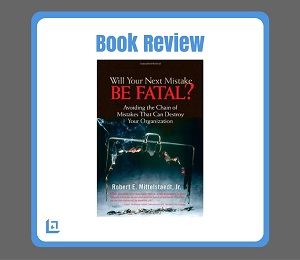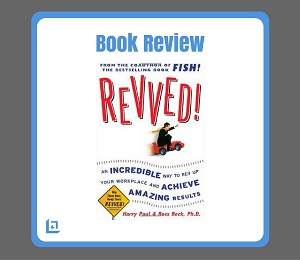- Home
- Leadership Book Reviews
- Will Your Next Mistake Be Fatal
Develop Leadership Skills To Avoid Disaster
Read "Will Your Next Mistake Be Fatal?"
Manager’s who develop leadership skills early in their careers are better able to avoid the common pitfalls that lead to making a mistake that becomes a fatal error for the business.

In his book, Will Your Next Mistake Be Fatal?, author Robert E. Mittelstaedt, Jr. provides examples of what business leaders do to prevent making fatal errors in their business.
The author reminds leaders to never get too far away from steering
the ship. While you can surround yourself with very talented and capable
managers, you should never allow yourself to get too far away from the
front line.
In order for you to properly address future issues you need to maintain a present-day perspective on what it takes for your front line people to be successful. Therefore, you must stay connected with that core group in order to best serve them and your customers.
"Only those who are willing to take risks will ever find out how far they can go. Taking only good calculated risk is the trick!"
As a result of having a greater amount of financial cushion, a large organization can withstand the blow of a mistake that can otherwise become fatal to the small business owner.
Due to the greater level of risk, small business owners must develop leadership skill that is effective. Having strong business planning and leadership knowledge is crucial to every new venture.
In addition to being an author, Mittelstaedt holds the position of Dean and professor of the W.P. Carey School of Business at Arizona State University. The 5 minute video below is worth watching as he talks to college graduates on the importance of ethics in leadership and the importance of entrepreneurship...
Develop Leadership Skills To Build A Strong Culture
 |
Mittelstaedt also makes the point that the culture of an organization can be a great asset, or it can be a liability that becomes the fatal mistake if not closely observed and nurtured.
For instance, a culture of “win at all costs”, or “victory or bust” may very well be the spur that creates an organization’s initial success – yet over time this very same mantra can become a stake in the heart of an otherwise promising company.
A company that is too proud to seek out and identify its areas for improvement will eventually suffer from its shortsightedness.
The sad fact is that most business cultures develop over time, by accident. Sometimes this works out well, but too often the culture becomes a fatal mistake that eventually handicaps or takes the company down completely.
Organizations like McDonalds and Southwest Airlines are examples where
the leaders established a clear vision of what the culture would be. As a
result of their well thought out planning, these organizations have
prospered due in part to a strong, vibrant and healthy corporate culture
of staying laser-beam-focused on the customers they serve.
"Life is inherently risky. There is only one big risk you should avoid at all costs, and that is the risk of doing nothing."
- Denis Waitley
Not All Risk Is Bad
In the final chapter “Making M3 Part of Your Culture for Success”, Mittelstaedt warns readers to not make the fatal mistake of avoiding making any mistakes at all.
While failure must be managed closely, it’s also important for leaders to develop leadership skills and insights to understand that it’s only through making mistakes that most people learn and grow. Therefore, the key is to avoid the major, most costly and dangerous mistakes, while still empowering and even encouraging team members to take educated risks.
Workers must understand that risk is the pathway to reward, but we must help people manage risk carefully and thoughtfully in order to minimize risk to the larger organization.
A manager looking to develop leadership skill and expertise only need
look back to the recent events of Worldcom, Enron, and more recently
Bank of America and Washington Mutual to see the potential pitfalls of
undisciplined leadership.
"You can measure your opportunity with the same yardstick that measures the risk involved. They go together."
Additional examples of fatal mistakes include the decisions made behind the Watergate scandal, the nuclear accident at Three Mile Island, and most airline crashes.
The simple truth is that almost all fatal mistakes can be avoided if the leadership is effective as managing risk.
Mittelstaedt, while sharing his insights on how to avoid fatal mistakes, does a nice job of empowering readers with realistic solutions for them to sink their teeth into.
Compelling and motivational, we recommend Will Your Next Mistake Be Fatal? as it is a terrific reminder for all leaders to take the time to develop leadership skills and expertise in the area of risk management.
As once stated by H. Jackson Browne, "Don’t be afraid to go out on a limb. That’s where the fruit is."
Author Bio
Robert E. Mittelstaedt, Jr. is the Dean of the Business School at Arizona State University.




